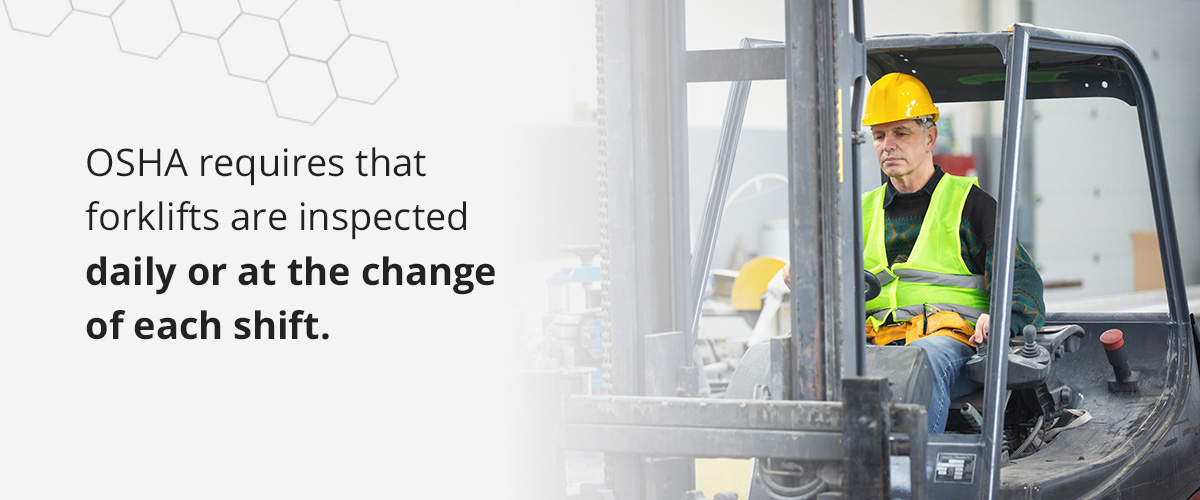Forklifts are essential tools in industrial and warehousing operations, critical for daily productivity and operational efficiency. However, the safety and longevity of these powered industrial trucks hinge on regular and meticulous inspections. By ensuring that each forklift is inspected properly and frequently, operators can prevent not only forklift accidents but also avoid costly repairs.

Upright Forklift Repair, serving both Houston and Humble, TX, specializes in the repair, service, and provision of spare parts for forklifts. Our expertise ensures that your forklifts remain in peak condition, safeguarding your employees and your business.
Should Operators Inspect Their Forklift
A forklift inspection involves a thorough visual and operational check to ensure all parts of the machinery are functioning correctly. This includes inspecting the operator compartment, hydraulic systems, moving parts such as the tilt control and chain anchor pins, and safety features like the seat locks and fire extinguisher.

Regular daily inspections, mandated by occupational safety guidelines and enforced by OSHA, are crucial. These not only help in maintaining the health of the forklift but significantly reduce the risk of malfunctions and accidents in the workplace.
By adhering to a comprehensive forklift inspection checklist, operators ensure the forklift’s safety and operational effectiveness, promoting a safer work environment and enhancing productivity.
Frequency of Inspections for Forklift Operators
Forklift inspections should be conducted at the start of each shift to ensure the equipment is safe to use. According to OSHA guidelines, daily inspections are mandatory for all forklift operators to comply with occupational safety standards. This routine check helps identify potential issues such as hydraulic leaks, exposed wires, or forklift overheating that could lead to serious accidents if left unaddressed.
Operators inspecting their forklifts daily not only comply with health administration requirements but also play a crucial role in maintaining a safe working environment. It’s essential that these inspections are documented in daily logs to track the forklift’s condition and maintenance history.
Key Components of a Forklift to Inspect Regularly
Maintaining a forklift requires regular inspections of several key components to ensure safe operation. These include:
- Hydraulic Fluid Levels: Check for leaks and ensure fluid levels are adequate to maintain good hydraulic function.
- Parking Brake: Verify that the parking brake engages and disengages properly and holds the forklift stationary when applied.
- Tilt Control: Ensure the tilt control operates smoothly to prevent loads from shifting unsafely.
- Chain Anchor Pins: Inspect for any signs of wear or damage as these are critical for load stability.
Additionally, checking the fuel tank position pin and ensuring the operator compartment is free from obstructions and debris can prevent accidents.
Regular maintenance of these components not only helps in avoiding forklift accidents but also extends the lifespan of the equipment, ensuring continuous use without costly downtime.
Special Considerations for Powered Industrial Trucks
Powered industrial trucks, such as forklifts, require specific maintenance protocols to operate safely and efficiently. These vehicles are integral to operations in warehouses, construction sites, and other industrial settings. Trained personnel are crucial for performing specialized maintenance tasks, such as checking hydraulic hose reels, inspecting tilt controls, and verifying that all safety restraints work properly.
The unique requirements of maintaining these trucks underscore the importance of having operators and maintenance staff who are well-trained and familiar with the specific needs of the equipment they handle. Proper training ensures that maintenance is done correctly, enhancing the safety and efficiency of the workplace.
Implementing a Forklift Inspection Routine
Integrating a systematic forklift inspection routine into daily operations is essential for maintaining the reliability and safety of your equipment. Utilizing standardized inspection sheets can help operators conduct thorough checks consistently.
Facilities that operate forklifts continuously must adopt a proactive maintenance strategy to manage wear and prevent breakdowns, ensuring that forklifts are always ready for use. Keeping detailed records of daily inspections aids in identifying patterns that may require preemptive maintenance, ultimately reducing downtime and extending the equipment’s lifespan.
When to Seek Professional Forklift Repair Services
When forklifts exhibit signs of mechanical failure, unusual noises, or hydraulic issues, it’s time to seek professional repair services. Upright Forklift Repair ensures the use of genuine spare parts and qualified service to maintain your forklift’s performance and safety standards.
Daily Forklift Inspections: Ensuring Safety and Compliance
Operators must conduct daily forklift inspections as required by OSHA. This routine includes checking fluid leaks, inspecting finger guards, and verifying the condition of carriage teeth. A standardized inspection checklist ensures each visual inspection is thorough and immediately reported if issues are found.
Key Elements of a Forklift Inspection Checklist
Each daily inspection should review the forklift’s operational safety features such as the clip retaining pin and plug connections. Operators inspect their forklift to ensure everything from the operating controls to safety mechanisms like the parking brake and finger guards functions properly.
Maintaining Your Forklift: Regular Checks and Balances
Forklift maintenance involves regular checks on hydraulic fluids and ensuring all connections are secure. The operator’s manual provides essential guidelines for daily inspections and maintenance routines, emphasizing the need for inspections to be inspected daily and issues to be immediately reported.
Forklift Safety Standards and Requirements
OSHA requires strict adherence to safety standards, which include the use of a forklift checklist to guide operators through each essential inspection point. This checklist helps ensure that every forklift is operating safely and efficiently, protecting operators and maintaining productivity.
